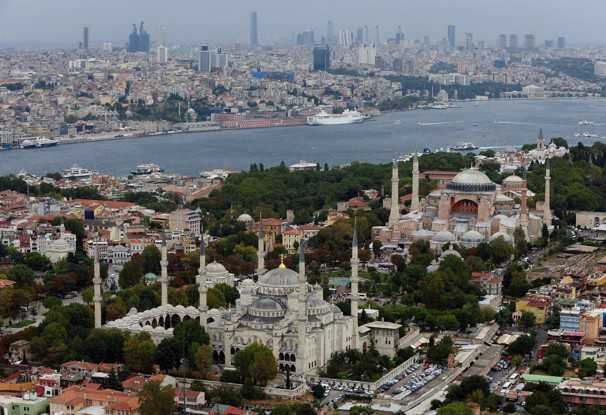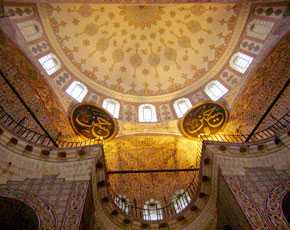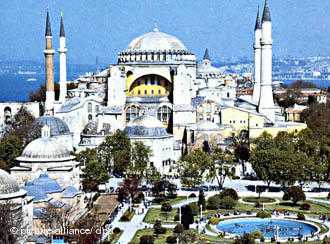« Le monde occidental ne semble pas être au courant de la menace immédiate et grave qui pèse sur les droits des femmes en Turquie. Le foulard est un symbole indubitablement politique. Il n’y a pas un seul exemple d’un pays musulman où les droits des femmes ont progressé d’un iota après que la religion ait été politisée ».
Mme Ozer Aksoy est présidente de la Federation of the Turkish Canadian Associations et vice-présidente du Turkish World Congress. Elle répond à un récent article naïf du Globe and Mail sur la question du foulard en Turquie.
If the Turkish secularity goes, so go the Turkish women’s rights, par Ozer Aksoy, Turkish Forum, le 24 juillet 2008
J’ai lu avec intérêt l’article de Mark Mackinnon Traditional headscarf unveils new rifts in Turkey (Globe and Mail, le 22 juillet 2008). Il semble y avoir une confusion de concepts – et je dis cela de la manière la plus courtoise possible – impliquant les dichotomies laïcité et islam, droit moderne et canons islamiques (charia), les élites et les non éduqués, le centre et la périphérie, Turcs noirs et Turcs blancs, vieille garde contre réformateurs islamiques, et plus encore. Je demande instamment à vos lecteurs d’acquérir une meilleure compréhension des dichotomies avant de s’embarquer dans une analyse des enjeux récents concernant la Turquie. Voyons si je peux jeter un peu de lumière sur tout cela.
Alors que le monde chrétien se caractérise par la séparation de l’église et de l’État, grâce à la période historique des Lumières, le monde islamique continue de traiter la démocratie et la laïcité comme les deux côtés d’une pièce de monnaie. Aujourd’hui encore, la plupart des pays musulmans enchâssent la charia dans leur constitution, laquelle n’est pas compatible avec la laïcité ou la démocratie.
La Turquie, d’autre part, avec une population à 99% musulmane, a été fondée en 1923 comme république laïque. Ainsi, le développement de la démocratie en Turquie a été construit sur de solides fondations laïques. La laïcité ne signifie pas « être opposé à la religion ». La laïcité témoigne d’un profond respect pour toutes les confessions car elle garantit les libertés individuelles tout en rejetant la supériorité d’une religion sur les autres. Si les fondations laïques de la Turquie étaient sapées, sa structure démocratique s’effondrerait aussitôt. Que répond à cela le représentant de l’AKP dans votre reportage ?
La population et les gouvernements turcs depuis 1923 ont toujours été fondamentalement pro-occidentaux, bien qu’entre 5% et 7% des électeurs, issus pour la plupart de divers milieux religieux, semblent toujours s’opposer à toute forme d’occidentalisation.
La révolution iranienne de 1979 a eu un impact considérable dans l’ensemble du monde musulman. En outre, certains pays du Moyen-Orient (comme l’Arabie Saoudite) ont essayé très fort d’exporter leur version de l’islam et ont fourni un soutien financier à divers cercles islamiques en Turquie.
La combinaison de ces deux facteurs a abouti à une explosion du religieux : des sociétés d’édition ont surgi, les publications islamiques se sont multipliées, des mosquées sont apparues à tous les coins de rues, se transformant rapidement en centres imposant le mode de vie islamique. Des femmes ont été « formées » et envoyées dans les maisons de chaque famille turque à faible revenu pour orienter et influencer d’autres femmes. Des cours sur le coran ont été organisés pour endoctriner les enfants à un âge précoce. Des étudiants universitaires et du secondaire ont été financièrement soutenus, sans condition. Des manifestations publiques ont été organisées pour exiger que les étudiantes se présentent à l’université avec des vêtements islamiques, y compris le foulard.
La presse religieuse a souligné que les femmes devraient également couvrir leur corps en entier. La plupart des étudiantes universitaires militantes étaient bien payées et ont insisté pour assister aux cours en tchador (un vêtement traditionnel noir qui recouvre la femme de la tête aux pieds). Elles étaient soutenues par des étudiants islamistes extrémistes et des avocats. Tout cela, alors que le Coran ne fait que suggérer aux femmes de couvrir leurs cheveux, mais ne l’impose pas. La plupart des médias ont appuyé les étudiantes islamiques sans savoir que celles qui portaient le foulard étaient des recrues payées (Fatma Benli interviewée dans votre reportage me les rappelle).
Le gouvernement Erdogan a entamé l’érosion du système laïc en 2002. Aujourd’hui, la situation n’est pas aussi innocente que le portrait qu’en donnent certains médias occidentaux. Il y a 67.000 écoles laïques contre 85.000 mosquées. Comparez les 77.000 médecins qui tentent désespérément de dispenser des soins de santé à 75 millions de citoyens turcs, avec les 90.000 religieux (ou imams) bien rémunérés par l’État qui dispensent la foi avec bonheur, aux frais des contribuables.
Bien qu’il y ait un seul hôpital pour desservir 60.000 personnes en Turquie, il n’y a pas de problème à trouver une mosquée pour chaque 350 personnes. Il y a 1435 bibliothèques publiques à travers la Turquie, mais 3852 classes sur le coran. Le budget des Affaires religieuses équivaut au coût de 22 universités. Le gouvernement Erdogan encourage ses partisans (et leurs entreprises) à stimuler le mode de vie islamique autour d’eux. Un nombre croissant d’hôtels et de municipalités offrent des piscines ségrégées, des maillots de bain de la tête à la cheville pour les femmes et le « hasema » pour les hommes.
Des publicités laïques destinées aux femmes ont été altérées avec Photoshop par certains journaux pour allonger les manches et les jupes portées par les mannequins. Certains hôtels et restaurants ont cessé de servir de l’alcool. On signale que des licences d’alcool ont été refusées et des sites internet pornographiques interdits. Et les imams – des prédicateurs islamiques employés par le gouvernement – continuent de fustiger librement les femmes qui osent sortir et travailler pour leur subsistance.
Tout aussi troublant, sont les différentes formes de pression exercées sur les femmes qui ne sont pas vêtues de manière suffisamment « islamique » ou qui partagent l’espace public avec les hommes. La presse islamique insiste qu’il n’est pas approprié pour les hommes médecins d’examiner les patients de sexe féminin, et vice versa. Certains étudiants en médecine ont mis beaucoup d’efforts pour tenter d’appliquer ces règles de la charia en Turquie, mais les autorités laïques les en ont empêchés.
Tous ces exemples sortent directement du répertoire de l’Iran et de l’Arabie saoudite. Alors que nous observons des programmes officiels d’islamisation en Malaisie, au Maroc, en Algérie, en Indonésie et en Iran, nous pouvons clairement voir comment ces « pays musulmans » se transforment en « états islamiques ». Dans tous les cas, les femmes ont d’abord été forcées de couvrir leurs cheveux et leur corps, et des changements systématiques dans le mode de vie au quotidien ont ensuite été progressivement introduits. Est-ce que ça sonne familier ?
Le foulard est plus qu’un bout de tissu. Attaché avec soin pour dissimuler le cou, la gorge et les cheveux, le foulard islamique est devenu le symbole indubitable de l’islam politique. C’est pourquoi les personnes laïques ont insisté pour l’exclure des universités et des institutions gouvernementales, comme l’exigent les lois laïques. S’ils ont encore des doutes, vos lecteurs doivent être informés que le Premier ministre turc a récemment fait une déclaration publique disant quelque chose à l’effet que « …le foulard est un symbole politique, et alors ?.. » Cette déclaration révèle ses intentions et aussi celles de son parti politique islamique.
La Cour européenne des droits de l’homme a statué en faveur de l’interdiction du foulard islamique dans les universités turques en novembre 2005, disant que « le foulard semble être imposé aux femmes en vertu d’un précepte religieux qu’il est difficile de concilier avec le principe de l’égalité des sexes ». La Cour constitutionnelle turque a aussi annulé une loi conçue par l’AKP islamiste qui aurait permis aux femmes de la république laïque de porter le foulard islamique dans les universités.
Le monde occidental ne semble pas être au courant de la menace immédiate et grave qui pèse sur les droits des femmes en Turquie. Il n’y a pas un seul exemple d’un pays musulman où les droits des femmes ont progressé d’un iota après que la religion ait été politisée.
L’alternative à l’extrémisme religieux n’est pas un coup d’État militaire. Je ne justifie pas une intervention militaire comme celle du 27 avril 2008. Bien qu’il soit souhaitable de préserver l’héritage laïc d’Atatürk, cela ne devrait pas se faire au détriment des processus démocratiques normaux.
Pour parler clairement, le foulard est la tyrannie des hommes sur les femmes. Toute tentative visant à justifier cette agression directe et brutale sur les droits des femmes, que ce soit au nom de la démocratie, des droits de l’Homme, de la liberté d’expression, ou d’autres principes, revient tout simplement à prendre part à cette tyrannie.
Voir aussi :
Du voile, de la charia et de la démocratie
Turquie – Demande d’interdiction du parti au pouvoir pour activités anti-laïques
Turquie -« L’immoralité nous vient de l’Occident »
Turquie – Manifestation contre la levée de l’interdiction du voile dans les universités
Turquie – Signes d’islamisation croissante






